It’s been awhile since I’ve posted anything because when you set out as explorers and then suddenly can’t explore anymore, it puts a big damper on things. Somewhere in my heart, I also wanted to give Panamá, this sweet little country that has such beauty and charm, the benefit of the doubt. (I’m over that now.) Mostly, I’ve been depressed about the situation and found it hard to put down words.
Here’s what’s been happening:
Locked Down Life
Even the most strict stay-at-home orders in the United States pale in comparison to what we have going on in Panamá. This began around March 18, when we went to the store in Pedasí to pick up a six pack of Balboa, our favorite Panamanian beer, and saw a sign on the cooler that alcoholic beverages were not for sale until further notice. To stop the spread of the novel coronavirus, the government of the Republic determined that people couldn’t drink for two main reasons: 1) When Panamanians drink, they get together. Don’t let them drink, and they won’t get together. 2) Reduce domestic violence. OK, I can get behind one of those, but the other one smacks of nothing less than the worst of patronizing. “You can’t take care of yourself or be responsible for your own behavior, so the government is going to regulate it for you.” (Subsequently, some eight weeks in, the dry laws were softened, allowing a person to buy one six pack of beer, one bottle of wine, or one bottle of liquor at a grocery store transaction. If the dry laws were, indeed, enacted to stem domestic violence, why would they lessen the dry laws before lessening the quarantine restrictions?)
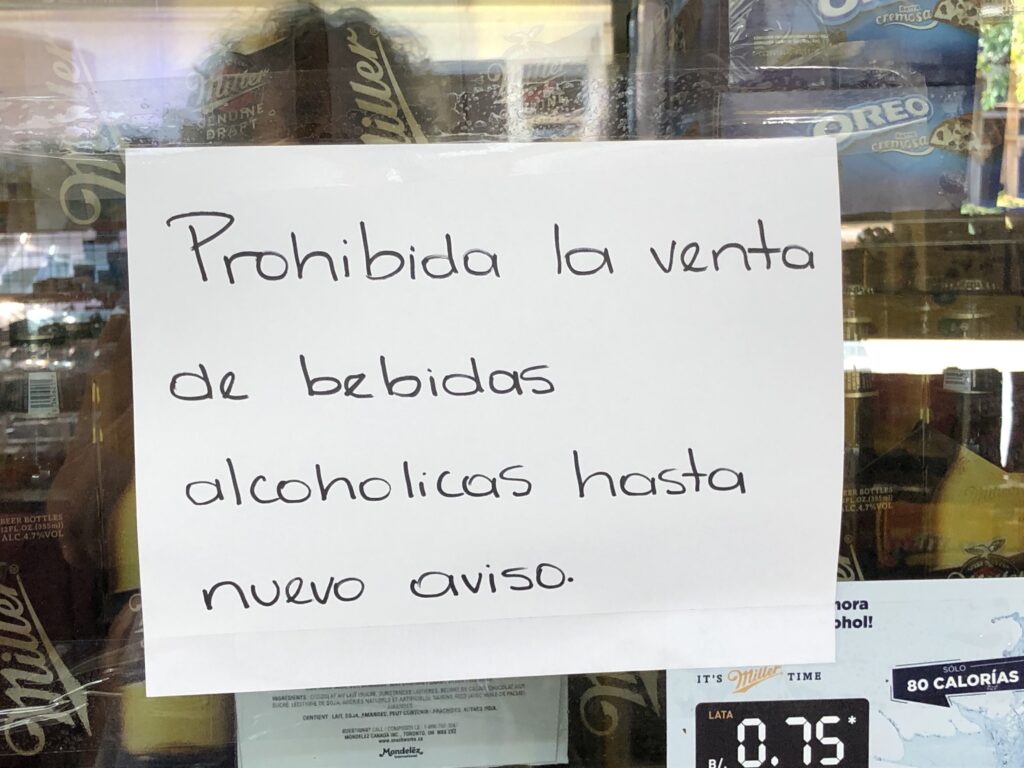
Speaking of those quarantine restrictions, here’s how they came about. A curfew from midnight to 5 a.m. was imposed on March 22. The next day, based on no new health information, it was tightened from 5 p.m. to 5 a.m. Then, on March 25, it became illegal to leave the house, except for two hours a day, based on the last number of your identification. Every citizen and resident of Panamá has a cedula, which is their national ID. Those of us who are just visitors are using our passports. After a few days, again, with no new health information, the government determined this system was not working well enough, so the week was divided up with women going out for their two hours on Monday, Wednesday, and Friday. Men could go out Tuesday, Thursday, and Saturday. Then for five Saturdays in a row, a full quarantine was implemented, meaning men could only go out on Tuesday and Thursdays. Bob’s lucky he has me to go to the store for him!
Meanwhile, the airport was closed to international traffic until April 23, then May 22, and now June 22 — this while the infection and hospitalization rates are declining. Roads are routinely blocked by random police check points. Police stand at the door of the local grocery store, checking ID numbers, taking people’s temperatures, and occasionally dispensing hand sanitizer. “Official” town vehicles with their yellow stripe as well as police cars cruise up and down the streets. Anyone who is out can be stopped for any reason at any time.
Every night, the Minister of Health and some of her minions with masks on hold a press conference to read in monotone a series of Powerpoint slides about the total number of cases, the total number of tests, and total number of deaths, the total number of people in ICU … The last three weeks they’ve started varying from the script a bit, loosening up the dry laws one night, announcing the plan of a plan of a plan to reopen about a week later, and revealing a week ago that folks can go out for exercise — only during their allotted day and time — within one kilometer of their home. Woo hoo. This is a bit cumbersome for those folks who can go out at 2 or 3 p.m. when it’s either raining or too hot to breathe, much less exercise.
Panama does not have a military, but the police are nationalized, meaning they work for the Republic, not for the communities where they are sent to enforce the law. So far, more than 32,000 arrests have taken place for breaking quarantine, mostly men and mostly in the crowded areas of Panamá City. Because officials don’t want to add people to the jails (a woman’s prison here has seen one of the country’s worst COVID-19 outbreaks), the folks are fined and sent on their way.
Las Lajas
Before I get any farther into this rant, let me explain where we are hunkered down. Our intention was to spend a week or so in the little community of Las Lajas, site of a 21 km beach and a pastoral, agricultural village, before we headed to the mountains for hiking and birdwatching. We had spent a few days there already at a wonderful Air B&B, and it seemed like a good side stop before we headed uphill. Our delightful place is Finca de la Suerte (Lucky Farm), a couple of casitas in a big yard with huge trees, a pool, and lots of colorful birds (http://heathers6wadventures.com/feathered-families-on-the-finca/ ). Once we got stuck here, we realized we probably couldn’t have been in a better place. Even dog walks aren’t allowed under the quarantine, so having a couple of acres for Tiki to wander around and for us to get time outside has been priceless. Our hosts, German expats Andrea and Detlef, and their dogs Max and Sally (who are twins, even though one is Doberman and one is a dachshund), are wonderful, warm, and welcoming. We will be forever grateful and connected for life because of this experience.
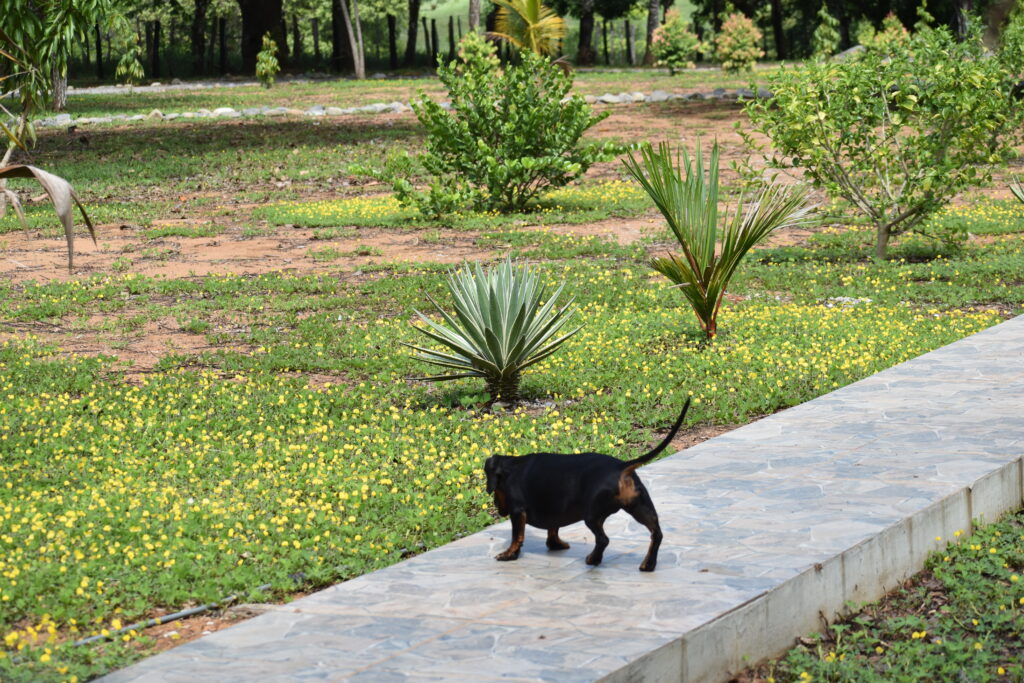
Sally 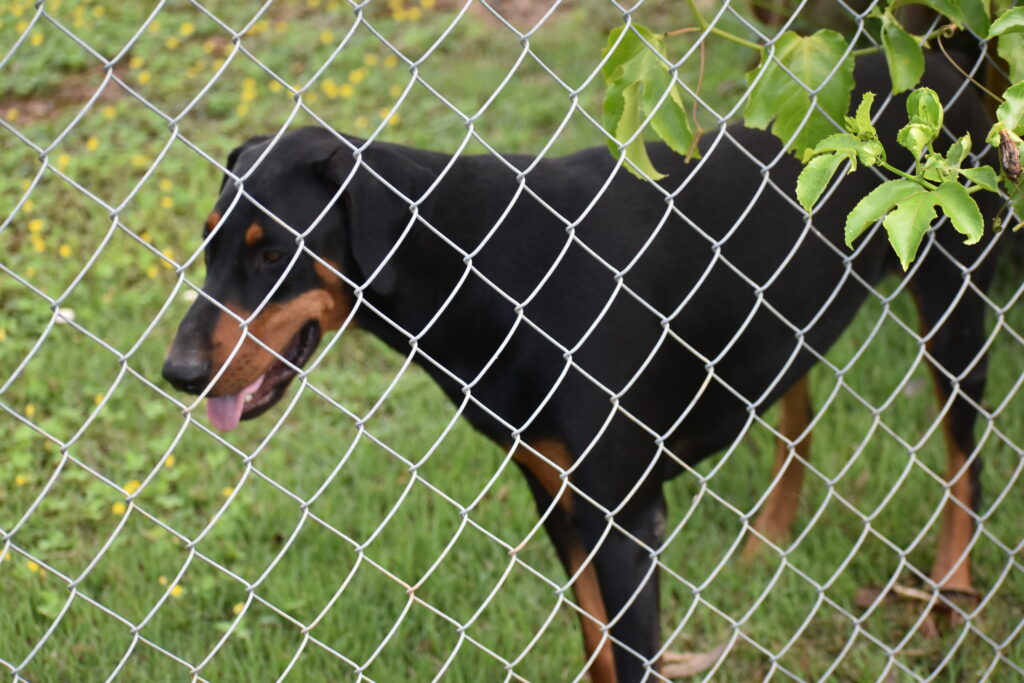
Max
The Tale of Pedasí
For us, the experience began in the little community of Pedasí, a quaint beach town that is famous for its wild and crazy Carnival celebrations. We were staying at a hostel there, with plans to go into Panamá City and meet a friend who was coming from the states, when rumblings of trouble began. An official with Panamanian immigration came to the hostel and demanded copies of our passports. We explained to him we were headed to Las Lajas in a day and his basic message was, “Good, get out of here.” That night, the hostel staff let us close up the place, as they were being shut down by the government. The next morning, we filled up with fuel and drove out of Pedasí, waved through a road block by the immigration official, a uniformed police officer, and the town’s mayor whose very strong message was, “Get the heck out of our town!”
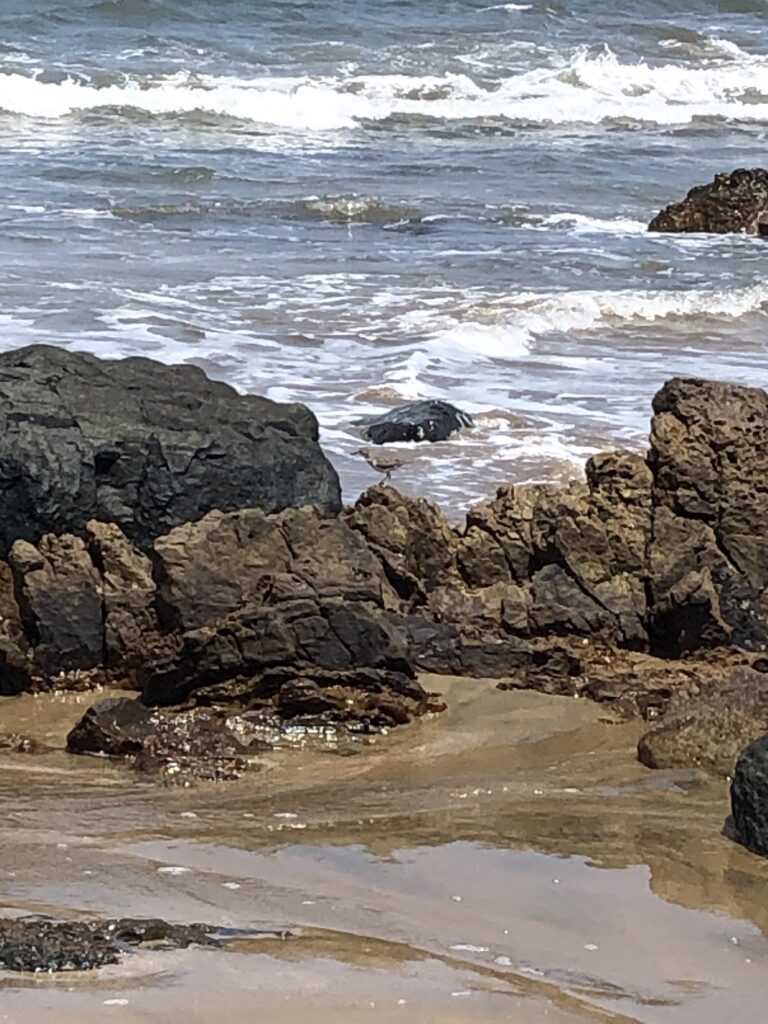
Pedasí Beach 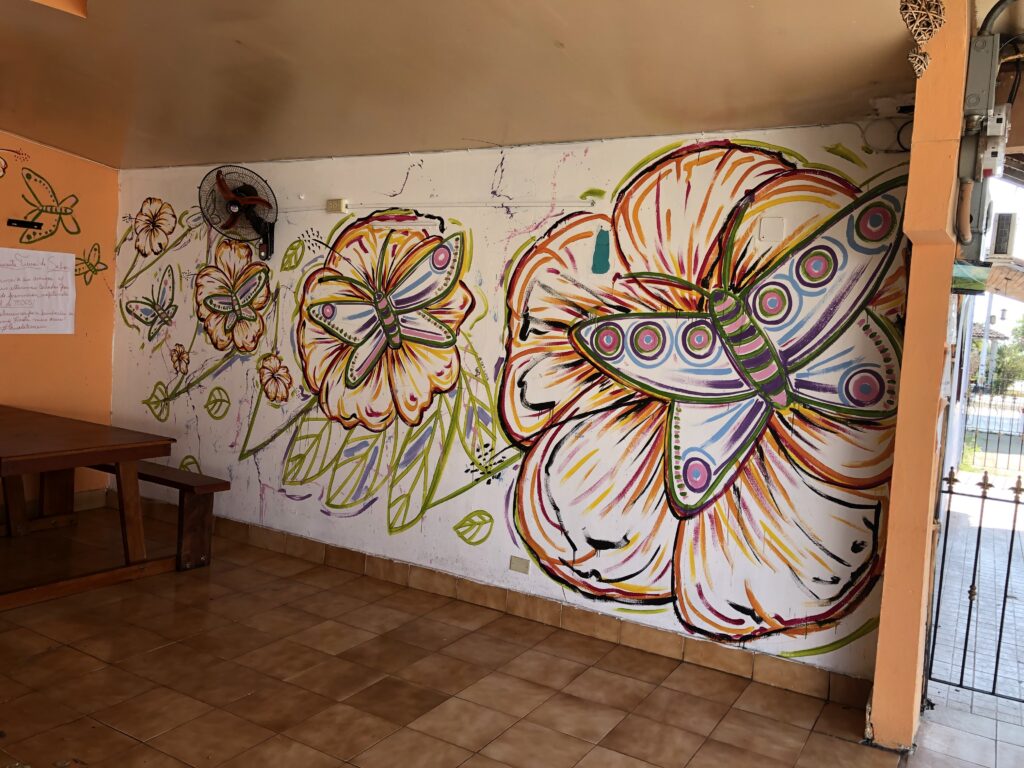
Some of the charm of Pedasí
Because everything was so uncertain and we didn’t have a permanent address, we wandered back roads across the Azuero Peninsula, a bucolic setting of farms and quaint towns. The police at the check point on the Pan American Highway waived us on. They were stopping people going into the peninsula, not coming out of it. Then we had two check points before we got to Las Lajas. At one, we told them were we were going, and they waved us through. At the final one, the officer kept us for quite some time. We couldn’t understand what he was saying from behind his mask, so finally I shrugged and said, “No entiendo” (I don’t understand). As traffic was starting to back up behind us, he shrugged, handed us back our passports, and sent us on our way.
We’ve watched with a sort of horrified fascination as the mayor of Pedasí, an adorable little town with its beautiful beaches has become nothing short of a dictator He is the only person in town who can protect it from the evil forces of the disease — just ask him — and he will cajole and coerce everyone to go along with him. Those businesses who donate food to him while he maintains his vigil on the road? They are good. Others, well, they might just have to be closed down. Suddenly, he and the police officers have all the free meals they want.
What was really scary was watching the Facebook page, “Pedasi Post,” where the people got on and supported his draconian efforts. Kick out the foreigners! (Um, most of you writing on this page are expats.) If any stranger comes onto the Azuero Peninsula, we’re all gonna die! (The peninsula had COVID cases when its own residents brought them in after visits to Panama City.) Our mayor is protecting us from all the evil in the world! Well, the little mayor was terribly embarrassed when a member of the National Assembly (the equivalent of the U.S. Congress) was busted on one of the community beaches. The assembly man said he was there assisting one of his constituents, a fisherman who was being harassed by local officials (fishermen and agricultural workers are exempt from quarantine). Now, why the assemblyman needed to be out on a jet ski while some of friends were in the fisherman’s boat with beers to assist this constituent has never been fully explained. No charges were pressed, though.
Government Corruption
The mayor and the assemblyman aren’t the only politicians taking advantage of the crisis, of course. A few weeks into the lockdown, the Vice Minister of the Presidency (not to be confused with the vice president) was forced to resign when it was discovered he spent thousands of extra dollars on some ventilators from — shocking — a company to which he had financial ties.
Early on, Panamá built a modular hospital to take in additional COVID-19 patients. Thankfully, it hasn’t been needed, since it’s been complete for over a month but isn’t usable. The Minister of Engineering and Architecture (or some such title/official) says the building isn’t safe for occupancy. I’m not sure if that’s because he hasn’t received his bribe or if it’s because the building contractor, who it turns out was related to someone high up in the government, really did do a bad job, at least according to some news reports.
Oh, we know it’s probably not any worse in Panamá than anywhere else in the world. They just seem to be more up front with it, unlike the U.S. where it’s all about who your politician dad or mom knows that gets you lucrative, do nothing jobs with foreign companies.
Expats
We’ve been both impressed and horrified by the behavior of some expats in Panamá. The good guys are those in Boquete and El Valle de Anton (http://heathers6wadventures.com/el-valle-de-anton-could-we-live-here/), who have, in spite of bureaucratic road blocks, both literal and figurative, donated time, money, and effort to deliver free food to hundreds of poor in the areas surrounding the communities. We were told the first time we visited Panamá that American-style programs of charitable giving and works are alive and well in this country because of the expat communities, and we’ve seen a lot of that in the last few months.
We’ve also seen some of the whiniest, most entitled acting, spoiled people on the planet. They complain about everything, including that official announcements are made in Spanish. Why are you even here, if that’s your attitude?
Panamanians
As in the U.S., our middle-class(+) friends who can telecommute are fine. However, even more than in the U.S., many Panamanians live paycheck to paycheck. Many don’t even do that, just getting $20 a day in cash to garden or clean a house or do some sort of manual labor. The idea of shopping for more than two or three days worth of groceries at one time is foreign because who has that kind of money? The government has provided some funding to some people, adding it directly to their IDs, which suddenly became like debit cards. But $80 for more than a month’s worth of groceries is not much, no matter how much rice and beans you eat. People are going hungry and protesting. Unlike some protestors in the U.S., here, the protesters are moms who can’t get milk for their kids, standing on a corner in a slum, pounding on metal pots with metal spoons. We’ll see how things go now that the plan for the plan for the plan to loosen quarantine is underway, but economic recovery here will probably take decades and, even with the Panama Canal, tourism may be a thing of the past.
Conclusion
There you have it. Has all of this bureaucracy and heavy-handedness put a tarnish on the beauty and charm of the country? Actually, it has. One of the attractions of Panamá for retirement living was the live-and-let-live attitude of both the natives and the expats. Everybody did their own thing, got together for fun parties, and let everybody else do their thing and even join in the parties. It was a fun place, full of friendly people with colorful traditions and a relaxed, fun way of life. It was said that Americans live to work and Panamanians worked to live. Now, everything just seems like drudgery. No one smiles under their masks. Shopping isn’t a time to explore and have fun and think about new foods to cook. It’s just a chore watched over by a cop. To go birdwatching, an early morning activity on a lonely country road, in a time and place where I would see no other people, is against the rules. If I get caught, I can be fined anywhere from $5 to $100,000 (yes, that’s one hundred thousand dollars). It’s just not fun anymore. The question is: Is any place else any better?